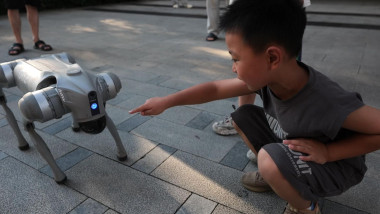China's robotic dogs still a novelty to most - as firms grapple with military using tech as weapons
From Beijing to Hangzhou, the sight of robotic dogs in a park is becoming more and more common.
Climbing stairs? No problem. And what about hills? They can do that too.
Josh Yuan showed us his robo-dog in one of Beijing’s fanciest shopping districts, guiding it through a crowd of curious onlookers with a handheld remote-controlled device.
He paid £1,300 for his new companion a few months ago.
“I think at the moment it’s for people like me, or tech geeks and programmers,” Mr Yuan said.
“But I think in the future, it will be quite common and humanoid robots will definitely enter people’s homes when they are more affordable.”
There are dozens of robot companies in China. A few of them, like the Hangzhou company Unitree, are focused on robotic dogs.
The Unitree team showed off their two latest models. One is a small dog, that can be used as a companion or dressed up in a dragon or panda costume for fun.
They also have a larger model, strong enough to lift me on its back.
It’s designed for industries to use and can carry supplies, be sent into a fire or emergency, or be used to check pipelines and infrastructure.
In May, however, robodogs received some extra - and unwanted - attention after China’s state media channel showed them being used in training exercises with weapons firing from their back.
The People’s Liberation Army was using these gun-toting robots as they trained with Cambodian forces. But Unitree says the video came as a surprise.
The company’s marketing manager, Duke Huang, explained: “We learnt about this [video] from the internet, just like everyone else. We didn’t know anything about it before that.”
These robots aren’t designed for military use, but the video caused a storm.
“We can’t control how buyers use the dog after they buy it,” Mr Huang says. “But we are thinking about how to prohibit military use in the future.”
With drones already operating on the battlefield, could robodogs be next? Unitree doesn’t think so.
“The dog is not that smart, it’s very simple,” Mr Huang says. “It still needs my control to move. It doesn’t have a brain.”
P W Singer, a strategist at the US think-tank New America who specialises in 21st-century warfare, says “almost every advancement made with AI and robotics in the civilian economy is being mirrored on battlefields”.
He notes that “many of the uses of AI and drones in wars like Ukraine and Gaza are almost direct applications of civilian tech”.
